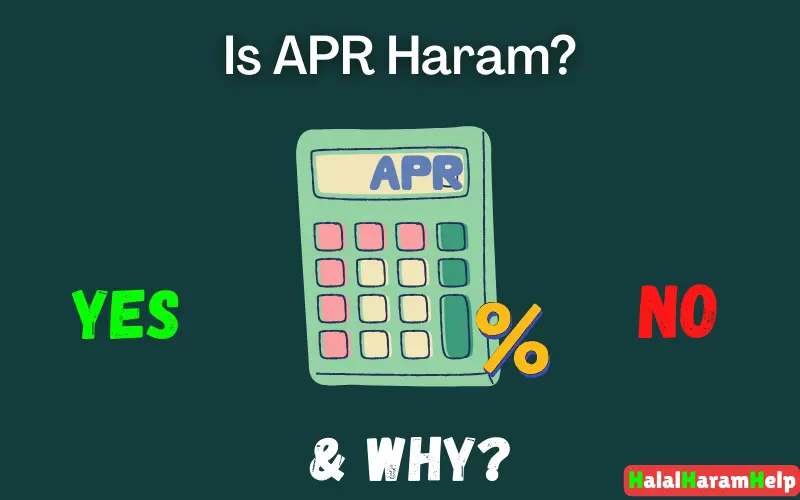In the world of money, we often talk about something called APR (Annual Percentage Rate).
It helps us understand how much we pay when we borrow money. But for people who follow Islamic rules, a question arises is APR haram in Islam?
Islamic finance follows special rules based on ethics and religion. One of these rules says no to interest or riba.
So, let’s learn together if APR fits with Islamic rules or if it goes against them with proof.

Is APR Haram?
APR can be considered haram in Islamic finance as it includes interest (riba), which is prohibited in Islam.
However, if the APR is structured by Islamic principles, such as profit-sharing arrangements or lease agreements, it may be permissible.
Therefore, whether APR is haram also depends on how it aligns with Islamic finance principles, particularly the prohibition of riba.
For example, if you’re considering financing a car or a house through a conventional loan with interest, the APR associated with such loans would typically be considered haram.
However, if you opt for Islamic financing alternatives such as ijara (leasing) or Murabaha (cost-plus financing), where the APR is structured in compliance with Islamic principles, it is considered permissible.
You might also like knowing is credit card halal.
What Is APR Exactly?
Understanding APR (Annual Percentage Rate) is essential to grasp why it may be considered haram in Islamic finance.
APR represents the yearly cost of funds over the term of a loan, including interest and certain fees.
In Islamic finance, the concept of interest (riba) is prohibited due to its exploitative nature and potential for economic injustice. Thus, if APR includes interest, it conflicts with Islamic principles.
Why To Avoid APR
Avoiding APR, particularly when it involves interest, is crucial for those adhering to Islamic principles.
In Islam, interest (riba) is considered exploitative and unjust, leading to social and economic imbalances.
By steering clear of APR that includes interest, Muslims can ensure they comply with their religious beliefs and contribute to a fairer financial system.
Therefore, avoiding APR with interest aligns with ethical and religious obligations, fostering a more equitable and just economy.
Alternatives To APR in Islamic Finance
In Islamic finance, several alternatives to APR comply with Sharia principles, avoiding the use of interest (riba). Here are some key alternatives:
Murabaha (Cost-Plus Financing):
In a Murabaha transaction, the bank purchases an asset and sells it to the customer at a profit margin agreed upon by both parties.
The customer then pays for the asset in installments. This method ensures transparency and avoids interest since the profit margin is fixed and agreed upon at the outset.
Ijara (Leasing):
Ijara works similarly to a conventional lease. The bank buys and leases out an asset to the customer for a fixed rental payment.
The ownership of the asset remains with the bank, and the customer has the option to purchase the asset at the end of the lease term. This model avoids interest and provides a halal way of financing assets.
Also see is debit card halal.
FAQs
Q1. Is APR halal in Islam?
A: APR is generally considered haram in Islam if it involves interest (riba), which is prohibited.
Q2. Is 0% APR halal?**
A: 0% APR can be halal if it does not involve any hidden interest or fees and aligns with Islamic financing principles.
Q3. Is it haram to have an APR on a credit card?
A: Yes, having an APR on a credit card is usually haram because it typically includes interest charges.
Q4. Is APR crypto haram?
A: APR in crypto can be haram if it involves interest, but it depends on the specific structure and whether it complies with Islamic finance principles.
Conclusion
Navigating the complexities of modern finance while adhering to Islamic principles can be challenging, especially when it comes to understanding whether APR is halal or haram.
Traditional APR, often involving interest (riba), is generally considered haram in Islam. However, there are Sharia-compliant alternatives like Murabaha, Ijara, Musharaka, and Mudaraba that provide ethical and permissible ways to finance purchases.
By opting for these Islamic financing methods, Muslims can ensure their financial practices align with their faith, promoting justice and fairness in economic dealings.
I hope all your doubts regarding APR are answered in this blog post. If you’ve any related queries feel free to comment below.


